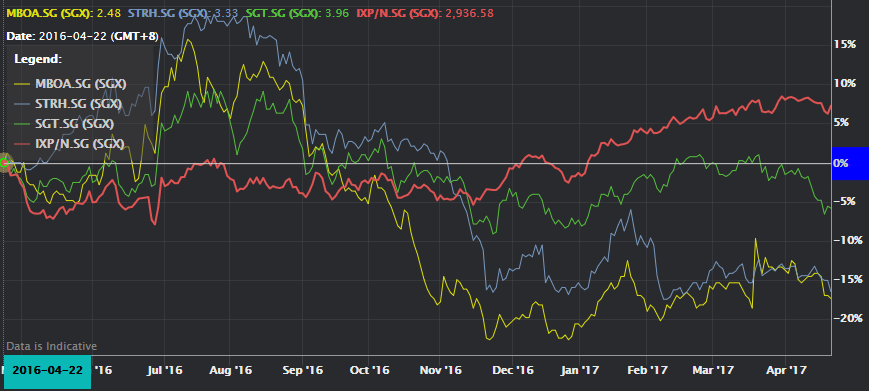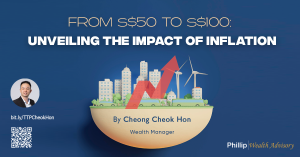Comparison between 3 Telcos and M1 Earning Updates April 25, 2017
M1 Earnings Update
It is earnings season again and we have M1 leading the pack, releasing their first quarter earnings early last week. M1’s business is segregated into four segments, namely mobile services, fixed services, international call services, and handset sales; the first three are collectively known as Services revenue.
Based on their first quarter results, we know that:
- Mobile Telecommunication Services dropped 3.5% Y-O-Y (S157.6 mil Vs $163.4 mil);
- Mobile customer base increased 5.4% Y-O-Y (1,941,000 to 2,046,000);
- Mobile data contributed 55.1% of service revenue;
- Average revenue per unit (ARPU) declined Y-O-Y in all segments;
- Net profit declined 14.6% to S$36.3 million, mainly due to higher cost of sales, interest expense and depreciation expense;
- EPS declined 14.2% from 4.5 cents in 1Q16 to 3.9 cents.
From the results above, investors should be wary that M1 is getting an increased mobile customer base yet a decline in mobile services revenue, a telltale sign that profitability margin is on the decline. Whether this trend of margins being squeezed is only specific to M1, investors ought to take a closer look at the overall telecommunication industry.
Telecommunication Industry
By now, most of us should be aware that TPG, an Australia company, has won its bid to become Singapore’s 4th Telecommunication Company. What is surprising as well is Circles.Life, who sign an agreement to use M1 infrastructure launched its own postpaid plan. Circles.Life is targeting 4-6% while TPG is aiming for 5-6% market share in a short period to bring their EBITDA to a positive region. Since the announcement of the 4th telco in September 2016, our 3 telcos have underperformed the STI index.
 Source: POEMS 2.0 (Red-STI Index, Green-Singtel, Blue-Starhub, Yellow-M1)
Source: POEMS 2.0 (Red-STI Index, Green-Singtel, Blue-Starhub, Yellow-M1)
With the advancement of smartphones, mobile revenue contributed a significant portion of the service revenue. Intensified competition and price war have also led to “smaller cost, larger data”. While this has been good news for consumers, it isn’t positive for the telco sector.
Comparsion of Singtel, Starhub and M1
Traditionally, investors have long been attracted to telco for their defensive nature, predictable income and yet attractive dividend yield.
| Singtel | Starhub | M1 | |
| Dividend (Trailing Twelve Months) | $0.175 | $0.200 | $0.129 |
| Last Done Price (21 Apr 2017) | $3.73 | $2.78 | $2.04 |
| Dividend Yield | 4.69% | 7.19% (5.76%*) | 6.32% |
| Market Share (As of 31 Dec 2016 AR) | 48.6% | 27.4% | 23.8% |
| Price to Earning Ratio** | 15.567 | 14.112 | 13.224 |
| Price to Book Ratio** | 2.234 | 24.644 | 4.324 |
* 5.76% calculated based on Starhub latest dividend guidance of 4 cents per quarter
** Ratio extracted from SGX Stockfacts, based on closing price of 21 April 2017
Investors putting money for dividend yield should be aware that dividends are paid out of company profits. Therefore, dividend yield calculated on historical earnings is never an indication of future earnings. Possible lower future profit is going to make investors’ yield significantly lower than what they are expecting.
Knowing that competition has increased and margin is most likely going to stay tight, investors taking a stake in the telecommunication sector can look at their earnings diversification. Companies that have diversified income stream may see lesser impact on their earnings due to heightened competition in Singapore.
If you wish to know more information about stocks, you can speak to your designated Trading Representatives or a Dealer at a Phillip Investor Centre near you.
Disclaimer
These commentaries are intended for general circulation. It does not have regard to the specific investment objectives, financial situation and particular needs of any person who may receive this document. Accordingly, no warranty whatsoever is given and no liability whatsoever is accepted for any loss arising whether directly or indirectly as a result of any person acting based on this information. Opinions expressed in these commentaries are subject to change without notice. Investments are subject to investment risks including the possible loss of the principal amount invested. The value of the units and the income from them may fall as well as rise. Past performance figures as well as any projection or forecast used in these commentaries are not necessarily indicative of future or likely performance. Phillip Securities Pte Ltd (PSPL), its directors, connected persons or employees may from time to time have an interest in the financial instruments mentioned in these commentaries. Investors may wish to seek advice from a financial adviser before investing. In the event that investors choose not to seek advice from a financial adviser, they should consider whether the investment is suitable for them.
The information contained in these commentaries has been obtained from public sources which PSPL has no reason to believe are unreliable and any analysis, forecasts, projections, expectations and opinions (collectively the “Research”) contained in these commentaries are based on such information and are expressions of belief only. PSPL has not verified this information and no representation or warranty, express or implied, is made that such information or Research is accurate, complete or verified or should be relied upon as such. Any such information or Research contained in these commentaries are subject to change, and PSPL shall not have any responsibility to maintain the information or Research made available or to supply any corrections, updates or releases in connection therewith. In no event will PSPL be liable for any special, indirect, incidental or consequential damages which may be incurred from the use of the information or Research made available, even if it has been advised of the possibility of such damages. The companies and their employees mentioned in these commentaries cannot be held liable for any errors, inaccuracies and/or omissions howsoever caused. Any opinion or advice herein is made on a general basis and is subject to change without notice. The information provided in these commentaries may contain optimistic statements regarding future events or future financial performance of countries, markets or companies. You must make your own financial assessment of the relevance, accuracy and adequacy of the information provided in these commentaries.
Views and any strategies described in these commentaries may not be suitable for all investors. Opinions expressed herein may differ from the opinions expressed by other units of PSPL or its connected persons and associates. Any reference to or discussion of investment products or commodities in these commentaries is purely for illustrative purposes only and must not be construed as a recommendation, an offer or solicitation for the subscription, purchase or sale of the investment products or commodities mentioned.
About the author

Mr Michael Tay
Equity Dealer
Mr. Michael Tay currently provides dealing services to over 17,000 trading accounts and is part of the POEMS Dealing, the core in-house dealing department of Phillip Securities Pte Ltd. Michael is a strong believer of value investing, focusing on companies with strong fundamentals and good dividend policy. Apart from his dealing role, he often provides training seminars on Fundamental Analysis topics to further enrich his clients’ financial knowledge. Michael holds a Bachelor Degree of Finance from the SIM University (UniSIM) and was awarded the CFA Singapore Silver Award in 2012.

 Back in Business: The Return of IPOs & Top Traded Counters in March 2024
Back in Business: The Return of IPOs & Top Traded Counters in March 2024  From $50 to $100: Unveiling the Impact of Inflation
From $50 to $100: Unveiling the Impact of Inflation  How to soar higher with Positive Carry!
How to soar higher with Positive Carry!  Why 2024 Offers A Small Window of Opportunity and How to Position Yourself to Capture It
Why 2024 Offers A Small Window of Opportunity and How to Position Yourself to Capture It 









